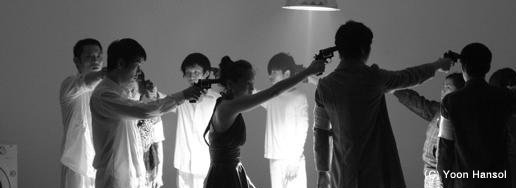Step-Memories ― Return of the Oppressed
greenpig [Korea]

Performing Arts Festival launching from Tokyo
Director Hansol Yoon studied theatre in Seoul and New York, before forming greenpig in 2006 to create satirical work dealing with social issues.
"Step-Memories - Return of the Oppressed" was first performed at Total museum in Seoul in 2010, and is composed of references to testimonies from survivors from the Korean War, and theoretical texts, as well as the historical space itself where the performance took place. The site-specific, promenade-style performance saw the audience move around the museum building, addressing the problem of how to discuss memories that cannot be talked about. At Festival/Tokyo greenpig will use the whole of the Nishi-Sugamo Arts Factory building - a former middle school - creating a new Tokyo version of the performance. The title of the piece is a coined expression meaning to reconstruct memory that cannot be returned to the facts.
The Korean War erupted in 1950, rending the peninsular into north and south. Even today a full conclusion to the situation is not foreseeable and it continues to yield a large influence on contemporary Korean society. While maintaining the imagery of this unprecedented war, though without glorifying the memory of the victims, how is it possible to talk about what happened?
Turning towards the disassociation between the survivors of the war and contemporary society, and the mutual trauma between victims and perpetrators, greenpig employ fragmentary scene images, music and video to materialize the buried memories of national and racial history, an experiment in making "testimony". Hansol Yoon says: "Talking about war is talking about memory." For the audiences it is not a recreation of memory, but rather a time for dialogue with memory.
For this Tokyo version of the play, 5 new Japanese performers will be added to the cast. Research will also be carried out on the neighborhood surrounding the Nishi-Sugamo Arts Factory. The venue itself used to be a middle school, as well as a film studio, and these particular histories will be integrated into the creation process and final presentation. The history of Korea cannot be isolated from Japanʼs, and the performance will also reflect this, as well as the situation in Tokyo and Japan following the Tohoku earthquake and tsunami last year, evoking the imagination in audiences that is needed now more than ever to talk about and face up to our present reality and our memories.